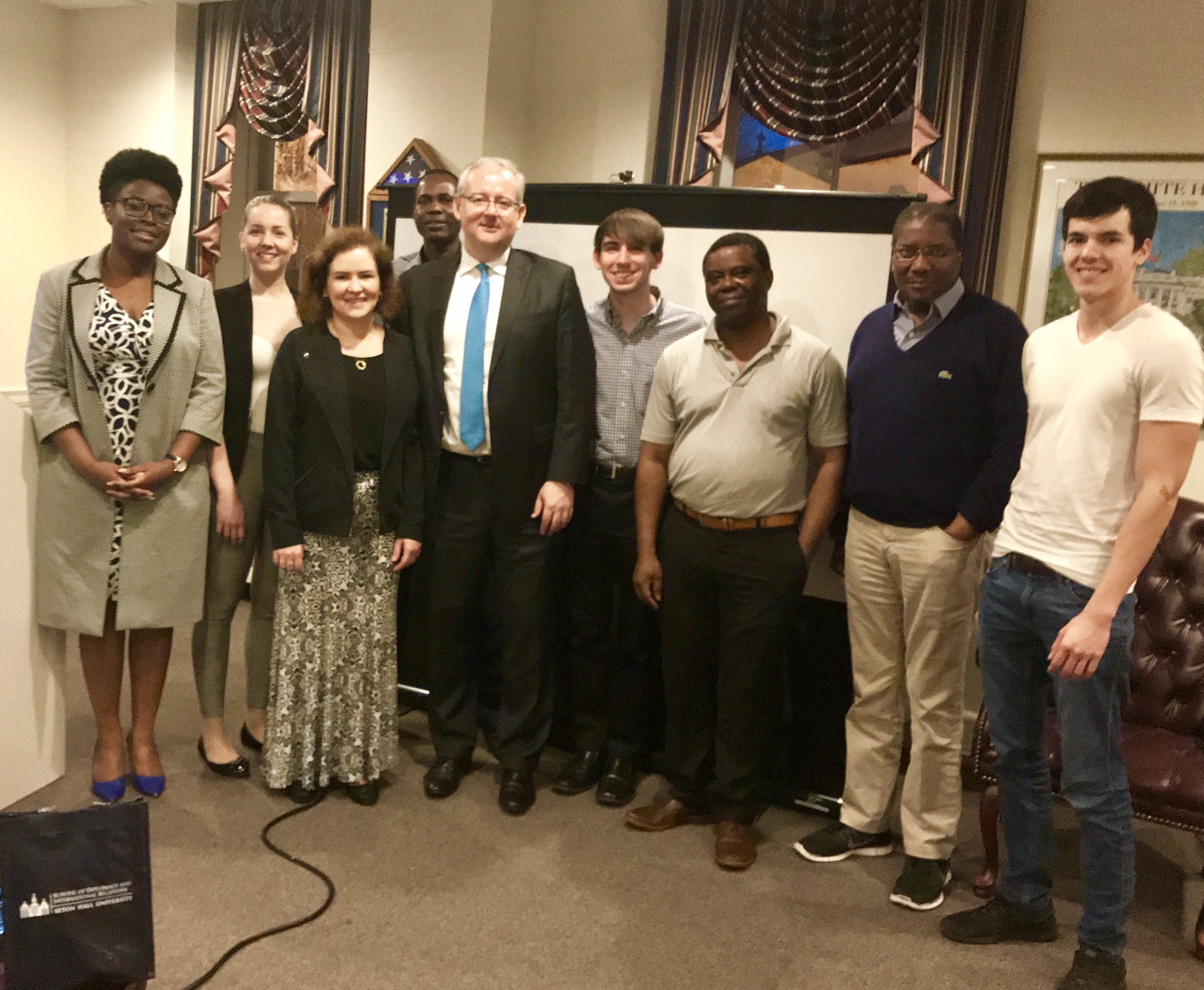Students of the School of Diplomacy recently attended an informative lecture- Keeping the Peace: An Insider Look at the United Nations Peacekeeping Operations. Leading the discussion, François Grignon spoke about his experiences on the field and the operations he participated in throughout the African region. Grignon emphasized the importance of UN peacekeeping operations and the challenges ahead when observing the needed development in conflict prone-areas.
Accepting an invitation from colleague Joao Honwana, the current De Mello Visiting Chair at the School of Diplomacy, Grignon seemed enthusiastic to share his insight and overall perception of UN peacekeeping operations. Grignon has a number of positions including Team Leader for Sudan/South Sudan, UN Department of Peacekeeping Operations and Former Director of the Africa Program, and member of International Crisis Group. He specializes in conflict analysis, state-building, democratization processes, and peacekeeping and peacebuilding. With expertise in African politics, Grignon assisted in a number of operations including operations in Zimbabwe and South Sudan.
During his lecture, Grignon reflected on operations in a recently established state, the Republic of South Sudan. Founded in 2011, South Sudan is crippled with a number of concerns including economic stability and financial security. UN peacekeepers seek to stabilize, consolidate, and drawdown current tensions seen within South Sudan boarders. Peacekeeping missions may too consist of political negotiation approaches to implement a successful political process.
According to researchers, economic instability is a leading contributor to civil wars and conflict. Grignon further noted that currently 80% to 87% of South Sudan’s population are internally displaced persons (IDPs), and regional incidents of violence increase the likeliness for a rise in the number of IDPs in the region. Other concerns in South Sudan include land grabbing, human rights violations, and managing of oil resources.
The United Nations Mission in South Sudan (UNMISS) recently forecasted that an estimated 155,000 individuals, particularly 29,000 children, may face famine. This statement was released after a new report on food security claimed one million individuals are presently in need of assistance, which is a 40% increase from a 2017 study. Referring to these studies, the UNMISS predicts an urgent need for massive humanitarian assistance.
In order to meet the demands, resources are mandated to sustain peacekeeping operations. UN expended over 7 billion in peacekeeping operations around the world including Darfur, South Sudan, and the Republic of Congo. However, during a sensitive and imperative time, member states of the UN are asking for a reduction of resources spent on related peacekeeping implementation. With a rapid increase in migration, there are particular areas which are prone to have an aftermath conflict due to the scarcity of resources. Grignon sees that it is imperative that state actors engage in peace operations and other measures to ensure peace and security.
“Peacekeeping implies there is a peace to be maintained,” added François Grignon.
Initially, according to international law, the UN requires a state’s permission before engaging in peacemaking and peacekeeping efforts. After the request is made, the UN is authorized to secure and protect civilians including women and children.
UNMISS gave an assessment stating the South Sudan government, along with international organizations, are more likely to continue forming alliances with political-military groups. Geographically, armed confrontations continue in the Greater Upper Nile and Equatoria. This, in turn, may yield, opposition conducting guerrilla tactics if they are lacking in supplies and resources. In regard to IDPs, they would continue to remain at UN protection sites, and as mentioned previously, the number of refugees is likely to increase. Given the number of contributing elements, the UNMISS is forced to increase their military presence in Greater Equatorias.
UN operations do not necessarily consider force as the first option, but rather utilize weapons to detract from threat and protect life.
“The use of force is the last resort and should not justify the lack of investment in the political process,” reiterated François Grignon.
Although there are complex indications in the fabric of peacekeeping operations, UN peacekeeping operations are essential to the prevent catastrophic events and ensure peace, security, and sustainability for the global community.
Ruthly Cadestin and Marcel Yameogo are UN Digital Representatives for the Center for UN Studies and Global Governance. Currently, they are graduate students at the School of Diplomacy and International Relations at Seton Hall University.
